My ultimate guide to soothing an upset stomach and relieving IBS symptoms naturally. These easy at-home remedies are affordable (or free) and help get your digestive system back in order quickly.

Photo Credit: Jen Schmidt Photography.
I’ve found there are three areas of focus when it comes to healing my gut naturally and maintaining gut health: 1.) Things I do daily to not aggravate my gut, 2.) Things I do daily to heal my gut and maintain gut health, and 3.) The instant fixes I employ when I’m having IBS symptoms to get my digestive system back in order.
In my post, My Journey With Gut Health, I discuss the first two – the things I do daily to not aggravate my gut, and the things I do daily to heal my gut. These habits also work as preventative measures, but I wanted to discuss the third matter – the instant fixes I’ve discovered that work so well for me to help calm a flair when I’m in the thick of it, because I know there are so many of you out there that are just looking for some relief now.
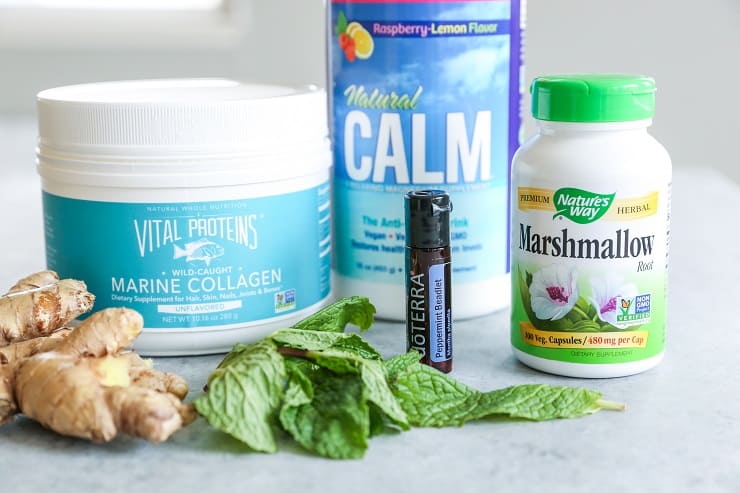
If you’ve struggled with IBS symptoms or gut problems (ranging from candida or leaky gut to Crohn’s), you know how debilitating they can be. Depending on your symptoms, whether you’re experiencing discomfort/pain, bloating, gas, and/or constipation, I have easy at-home tools that are inexpensive (or free) to treat any or all of your GI woes in the heat of the moment.
Here are some entirely natural remedies you can try at home to (nearly) immediately alleviate the symptoms (and potentially prevent said symptoms from occurring again!).
Note: If you have severe symptoms, don’t hesitate to consult a holistic or Western medicine doctor, as some illnesses need much more guided attention and thorough treatment.
1.) Ginger
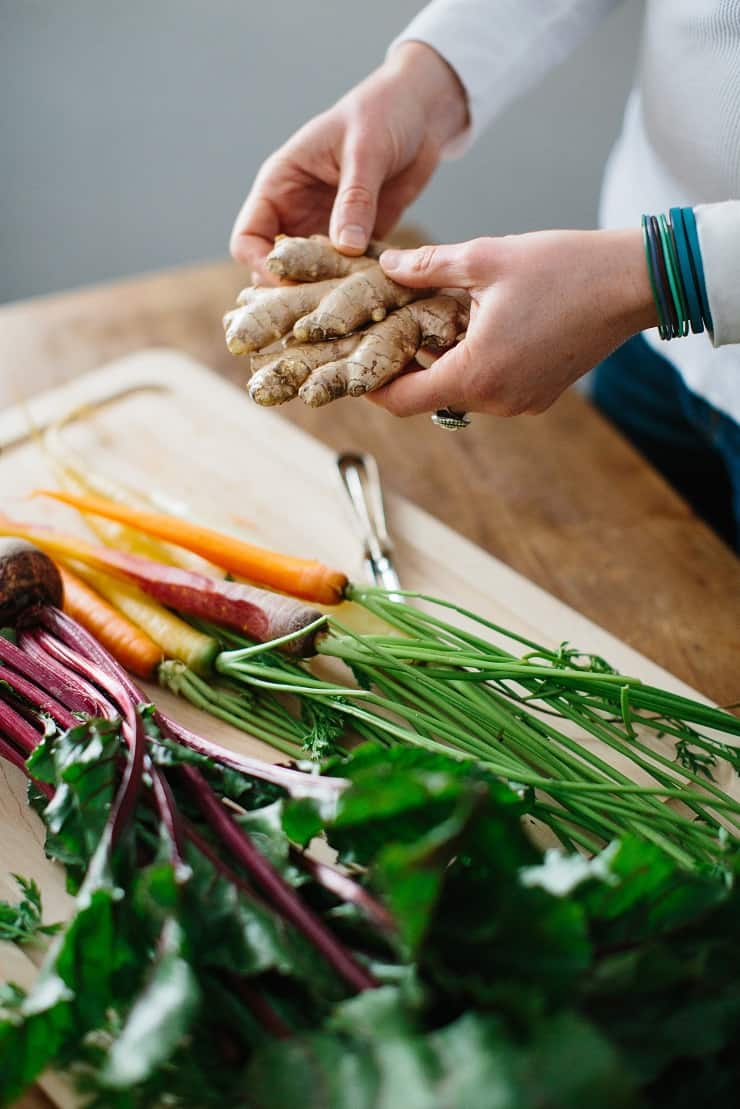
Photo Credit: Jen Schmidt Photography
Ginger has been used for medicinal purposes for over 2,000 years. Some of its healing properties include lowering inflammation (whether it be GI inflammation or overall inflammation in your body, joints, etc), aiding with digestion, easing nausea, relieving pain (due to its powerful anti-inflammatory property), healing skin problems such as acne, eczema, and psoriasis, and more.
Because ginger can be purchased from any grocery store, it’s easy to incorporate into your daily food regimen, but also brilliant to keep on hand for the times your stomach is upset. There are a number of ways you can consume it. You can cook it with your sauteed vegetables or incorporate it into sauce, grate it and make tea out of it, put it in your smoothies, and/or juice it and take it like a shot.
When my stomach is upset, I pull my ginger out of the refrigerator and make tea with it. To do so, peel the ginger and grate it (you’re looking for about 1 to 2 tablespoons of grated ginger). Add the grated ginger to a small pot of water (I make about 4 cups at a time) and heat it on the stovetop until it comes to a boil. Remove from heat and allow it to steep for 10 minutes. At this point, you can pour it into a mug including the ginger, or you can strain it through a fine mesh strainer if you’d prefer your tea to be fiber-less. Want to step it up a notch? Add a little bit of sea salt for electrolytes and some fresh lemon juice for additional antioxidant properties.
I’ve noticed a huge change in the way I feel after drinking a mug of ginger tea. I always make a large batch so that I can continue sipping on it throughout the day.
If you don’t enjoy the taste of ginger, or if you’re trying to get your kid to consume it, you can take ginger capsules. You can also take fresh ginger like a pill. To do so, simply peel the ginger and chop it into pill-sized pieces. Swallow 5 to 8 of the pieces whole (one at a time!) with water. Essentially, you’re making a pill out of ginger – don’t worry: your body will fully digest it.
Side note: If you or someone in your family has the stomach flu or food poisoning, try the ginger pill approach – their nausea should calm down as well as their vomiting fairly soon after taking it.
Read more about the benefits of ginger here.
In addition to ginger being a digestive aid, I also take Digestive Enzymes and Ox Bile with every meal to help digest protein, carbohydrate and fat.
2.) Bone Broth, Collagen, and Beef Gelatin
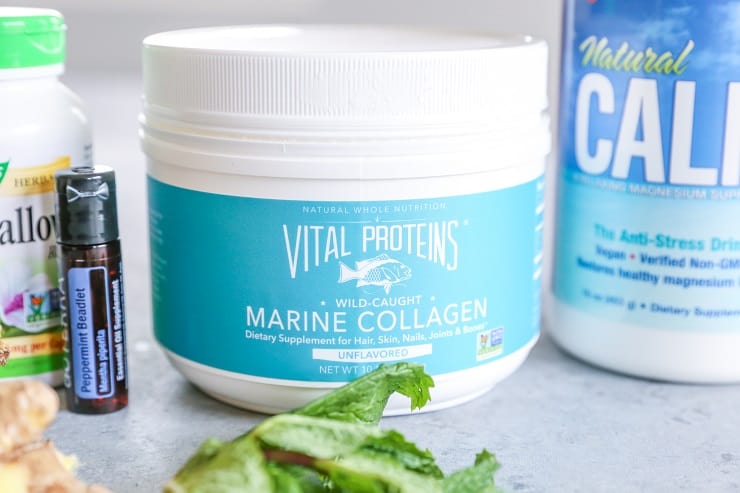
Bone broth contains all sorts of minerals and is also a great source of collagen. Collagen contains the amino acids proline and glycine which are the building blocks of your intestinal lining, making it essential in repairing a damaged intestine. Having an intact intestine ensures your poop stays where it’s meant to be (i.e. doesn’t leave your digestive tract and enter your bloodstream).
When my stomach is bothering me, I heat up 16 ounces of bone broth on the stove top and pour it in a mug to sip on it like tea. I almost always feel better after drinking bone broth, and I even drink it when I’m feeling in tip top shape because a.) it tastes fabulous, and b.) it’s one of my forms of preventative maintenance. I often use bone broth as a meal replacement for the times my belly is so upset that I don’t feel hungry. During those times, I also add a scoop of collagen peptides to the bone broth for an even bigger dose of collagen.
I add Vital Proteins Marine Collagen Peptides or Beef Gelatin to my matcha every single morning. I do this to help heal and maintain gut health, and I’ve noticed a HUGE difference since I’ve started doing this. I’ve noticed when I leave town for the weekend and don’t put collagen in my coffee while I’m travelling that I’ll have an upset stomach for a couple days following my trip. To remedy this, I travel with the travel-sized collagen sticks so that there isn’t a lapse in my collagen intake.
3.) Intermittent fasting
Giving your body a break from food allows it to focus on repairing damage. Digestion requires a huge amount of focus and energy from so many systems in your body. If you eliminate this task for 16-18 hours, your body is able to focus on healing damage rather than putting so much attention on the digestive process. Essentially, intermittent fasting can help boost your immune system in a BIG way so that your body heals enough in that short period of time to keep the party going.
That said, if you are diabetic or have blood sugar issues, are hypoglycemic, or simply cannot go long periods of time without eating, intermittent fasting is probably not a solution for you. Only you know what your body can tolerate.
I fast intermittently fairly regularly, and I notice a big difference when I do. I’ll eat dinner around 5:00pm, then not eat until 9am – 11am the following day (depending on my level of hunger). I do drink bulletproof coffee every morning, so technically that’s breaking the fast, but I still notice a huge improvement in spite of this technicality.
Without fail, when I give my body a break from food, I always, always feel stronger the next day, and my digestive system feels unstoppable. I’ve also noticed I have a pretty stellar poo after fasting (sorry if that’s TMI..it’s just the truth). If you’re concerned about how your body will react to intermittent fasting, you can ease into it by drinking bone broth, almond milk, or a super low-sugar smoothie (avoid juice!) between your dinner and breakfast.
When do I fast? I fast when I’m feeling abdominal pain and distention (like a mega version of bloating that comes with lots of discomfort) and do not feel hungry. This typically happens after I’ve eaten out several days in a row, have unintentionally consumed gluten, and/or simply hit the sugar or alcohol a little too hard. I never, ever fast when I’m super hungry, and I never fast during the day because I’ve found it leads to a huge plummet in my energy level. For this reason, I only fast overnight. I also unintentionally fast from time to time simply because it ends up working out that way when I’m travelling or for one reason or another.
Is intermittent fasting hard? Most of the time, not at all. The only time I’ve noticed it to be difficult is when I’ve been consuming too much sugar, because my body’s hunger signals become miss-wired due to the changes in blood sugar. I find I’m always hungry when I consume sugar (this includes unrefined sweeteners like pure maple syrup, honey, dates, lots of fruit, etc.), so when I’ve gotten myself off track (like during the holidays), I’ll get anxious for my first fast back.
All it typically takes is one solid overnight fast for me to feel like things are back in order, but doing a more mild 12-hour fast is perfectly fine to do regularly. When I’m eating normally (meaning eating very little sugar), intermittent fasting actually comes naturally for me, as my body becomes much more intuitive in my eating patterns, I feel less hungry, and going long periods of time between dinner and breakfast feels right.
One more quick note about fasting: I’ve always found my digestive system feels best when I don’t go to bed full. For this reason, I never eat past 7:00pm (most people extend this to 8pm), unless I’m travelling and don’t have another choice. In fact, when I do go to bed stuffed (after say an all-you-can-eat-sushi binge), it typically takes my digestive system 2 to 3 days to re-set.
One more quick note about fasting: Fasting is NOT disordered eating…until it is. Fasting is a completely normal habit to have, and humans are actually built to fast; however, don’t use intermittent fasting inappropriately to try to lose a lot of weight very quickly, because that sends starvation signals to your body, which can mess with your endocrine system (causes your hormones to become out of balance) and actually cause you to retain fat. Know when your eating habits are becoming too aggressive, and save intermittent fasting for the days you know it will help you rather than harm you.
4.) Gut-Healing Supplements: Marshmallow Root, Slippery Elm, L-Glutamine, etc.
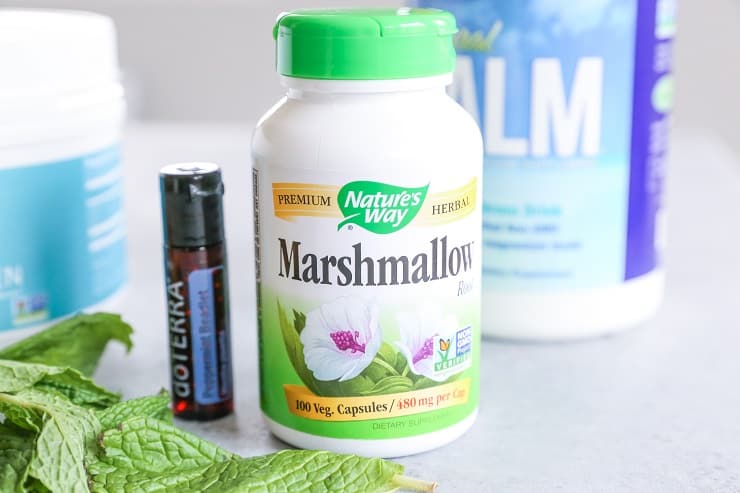
I take the supplement, GI Revive daily, which is a combination of marshmallow root, slippery elm, L-Glutamine and more. This combination helps seal your gut lining to heal leaky gut. While avoiding certain foods can help not exacerbate IBS symptoms, many people need more support when healing their intestinal lining.
Marshmallow root is a plant that has an incredible amount of medicinal properties, many of which aid digestive disorders. Marshmallow root helps repair your gut lining by forming a protective layer. This works wonders for those who have leaky gut syndrome, Ulcerative Colitis, and Crohn’s! It also helps relieve heartburn, constipation, diarrhea, stomach ulcers, and acid indigestion.
In this sense, not only can marshmallow root help when you’re currently experiencing symptoms, but it can also work to help alleviate chronic digestive disorders as well as to prevent symptoms in the future. You may find Marshmallow Root capsules, which you can find at any natural food store, or buy online to be helpful.
Other health benefits of marshmallow root is it helps treats colds and coughs, fights bacterial infections, helps treat skin issues such as eczema, reduces inflammation and water retention, and more!
To learn more about the ins and outs of marshmallow root, read this article from Wellness Mama. and this artificial from Dr. Axe.
5.) Peppermint
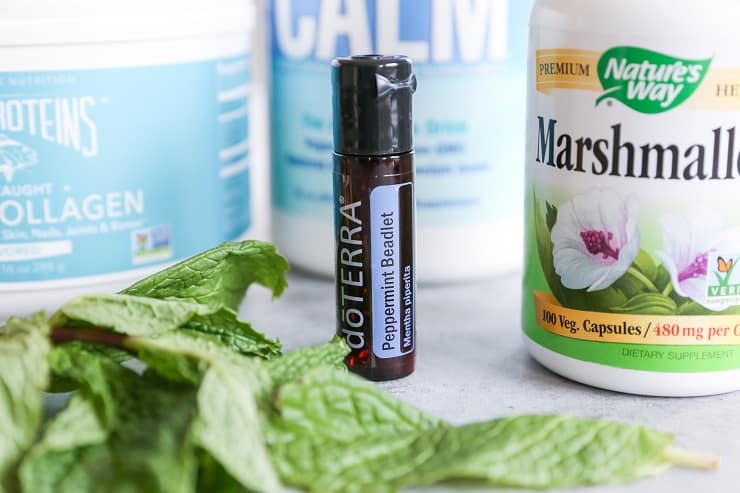
Peppermint is very calming on the digestive system and also has a numbing effect when you’re experiencing indigestion or gas. Whether you drink peppermint tea, take peppermint tablets or beads, or simply include fresh peppermint in your smoothies, you’ll notice peppermint can diffuse a gassy belly fairly quickly. Note: avoid peppermint candy, as it contains sugar which can worsen your symptoms.
When I’m having IBS symptoms, I’m in the habit of taking peppermint beads after I eat a meal, as coated peppermint beads survive the stomach and are released in the bowel, alleviating the affected area efficiently. You can also use peppermint capsules, but I’ve never tried them, so I can’t speak to their effectiveness.
Be careful with peppermint, as it can actually exacerbate heartburn if you have GERD. In this sense, don’t use peppermint for just any digestive ailment; use it only if you’re trying to relieve gas or bloating or are looking to alleviate nausea. (Source)
6.) Exercise

Exercise is a part of my daily life not only because it’s awesome for blood circulation, cardiovascular health, weight maintenance, is a natural anti-inflammatory and more, but it’s a huge priority for me in helping to control my IBS (I have IBS-C, which is the type of IBS that causes you to become constipated very easily).
While I’m an assertively active human on the daily, I also make a point of exercising if I’m having an IBS flair. A HIIT or cardio workout that raises my heart rate to its max is one of my top methods for relieving IBS symptoms, because it gets things moving. To some of you, it may sound unappealing to exercise when you aren’t feeling well, but my digestive system always feels more settled after I’ve broken a solid sweat. If you have IBS-D, the type of IBS that results in frequent bowel movements or loose stool, you’ll likely want to save exercise until your symptoms are a bit more under control.
If I’m gassy, I obviously skip the gym and go for a run outside (because: duh). Running helps me release gas, gets my digestive system moving, and releases my digestive enzymes so that my stomach not only feels more settled, but it feels ready for food (this process would take longer had I skipped the workout).
It’s important to be mindful about how you exercise. Depending on how sensitive your digestive system is, you can exacerbate your symptoms if you workout too hard or too frequently. You can also cause your body to go into adrenal fatigue and throw of your balance of hormones. This is where using your best judgement, paying attention to your intuition, and knowing what’s too much and what’s not enough comes into play.
If you’re in too much pain for an intense workout, walk it out! Walking is an incredibly healing practice, and according to Dr. Brooke Kalanick (an endocrinologist), it’s actually fabulous for hormone health, too!
Yoga is also phenomenal for digestive health, because spinal twists literally ring out your internal organs, which helps with the digestive process and also helps remove toxins from your body. If you have any sort of digestive issues, I highly, highly recommend you take yoga classes, as the meditative mindful piece also helps tremendously with healing from the inside out.
7.) Sleep
Go to bed. No joke. Close the blinds, put on your coziest pajamas, and get some fabulous shut eye.
One of the top causes of digestive issues is not getting enough sleep. You should be sleeping 7 to 9 hours every night to allow your body to digest, heal, and revitalize. Have you ever noticed if you wake up much earlier than normal for a trip or work meeting, you don’t get your solid morning poo? This is because your body wasn’t able to fulfill its digestive process. In this sense, you can actually become constipated if you continuously don’t get enough quality sleep. In the reverse, have you observed how amazing your poop was after a huge night of rest? Yup, your body needs sleep.
If you’ve found you’re deficient in sleep and you have digestive problems, your top priority should be improving your sleep life. Read the book, Sleep Smarter to learn how to train yourself to get consistently awesome rest.
I also take CBD oil to help me get a solid night of rest, but I never take melatonin.
8.) Magnesium
Most of us are deficient in magnesium, yet we need it for so many functions in our body! We need it for proper digestion, muscle recovery after a workout, hormonal balance, blood pressure, mood, and more.
If your major digestive problem is constipation, magnesium citrate can help regulate your bathroom habits. Not only is magnesium awesome for recovering from workouts, but it’s also a natural muscle relaxer, which, yes, helps your bowels move as well.
There are different types of magnesium, so just be sure to read the nutrition label to check which type you’re buying before you make the purchase.
Avoid taking magnesium carbonate, gluconate, sulfate, and oxide because all of these types don’t absorb well into your body. Magnesium Malate is also a great type of magnesium, and it’s meant for the daytime, as it has the opposite effect as magnesium citrate – it ramps you up.
Many powerlifters opt for this type and will take it before their workouts. Depending on what you’re going for, you can choose the type of magnesium that works best for your lifestyle.
Magnesium is such a big component of my gut routine that I even travel with it. I naturally become constipated when I travel (and used to get constipated regularly regardless of whether or not I was travelling), so bringing magnesium citrate with me is one of my time-tested methods to ensure I stay regular.
When my constipation got really bad, I used to take laxatives (I used ex-lax and Smooth Move tea), but I later read your body can become dependent upon laxatives, they can also cause damage to your internal organs, and can even cause cancer. After discovering this, I decided I’d figure out a daily routine to keep me regular – I eat tons of vegetables, drink bulletproof coffee in the morning, and take magnesium citrate at night. These three habits guarantee me a daily poo!
That said, most people should be supplementing their magnesium even if you don’t get constipated or have any sort of digestive issues – you need it for bone and heart health, blood sugar regulation, and much much more.
Learn more about why you need magnesium and how to tell if you’re magnesium-deficient HERE.
Additional Notes:
You’ll notice I didn’t include probiotics on the list, because I’ve found probiotics take some time to work. While they’re essential for maintaining a healthy, balanced gut microbiome, and you can definitely take them while you’re experiencing symptoms, they aren’t necessarily going to make your gas, bloating, and/or pain go away lickety split, you feel? That said, the probiotic I swear by is Mega Food MegaFlora Plus. It’s super concentrated, and I often take 2 to 4 capsules on the days I experience symptoms, and just one capsule on the days I feel great.
Some people find relief with activated charcoal powder or pills. Activated charcoal absorbs everything that’s going on in your digestive system, which can be an awesome thing if you’ve hit the alcohol too hard or have accidentally consumed a food you’re intolerant to and are experiencing gas or other GI backlash; but it truly does absorb everything, so you shouldn’t take it with medication, as your medication won’t get absorbed into your bloodstream.
I’ve tried activated charcoal on three separate occasions, and saw no relief. This doesn’t mean it won’t work for you, so feel free to keep activated charcoal in your goody bag, too! It’s certainly worth a try. NOTE: If you have IBS-D, you may find activated charcoal helps relieve your diarrhea and normalizes your stool. If you have IBS-C, use activated charcoal sparingly, as it can cause you to become constipated.
And as always,
Be Consistent with Your Diet
With all of this said, if you have IBS or other gastrointestinal issues, it’s important to be mindful of your daily routine to ensure your gut is functioning properly. I always stand by an unprocessed diet very low in sugar, as it keeps inflammation in your digestive system under control and starves your bad bacteria of what it loves to feed on.
If you have an overgrowth of bad bacteria, are hormonally imbalanced, or have an inflammatory or autoimmune disease, consider finding a diet that both suits your lifestyle and supports your gut health. For me, that is a Low-FODMAP, low-carb paleo (nearly ketogenic) diet. What works for me or others may not work for you, so always trust your body and know it’s okay to eat differently from your friends and family. Taking care of your holy temple is mission critical.
If you’re looking for ways to heal and repair your gut, check out my blog post, My Journey With Gut Health.
You’ve got this, and we’re in it together!
Xo
A recap of my IBS essentials:
- Digestive Enzymes and Ox Bile
- Peppermint Beads
- Marine Collagen Peptides
- Natural Calm Natural Vitality Magnesium Citrate
- Marshmallow Root Capsules
- GI Revive
- MegaFood Mega Flora Plus Probiotic Supplements


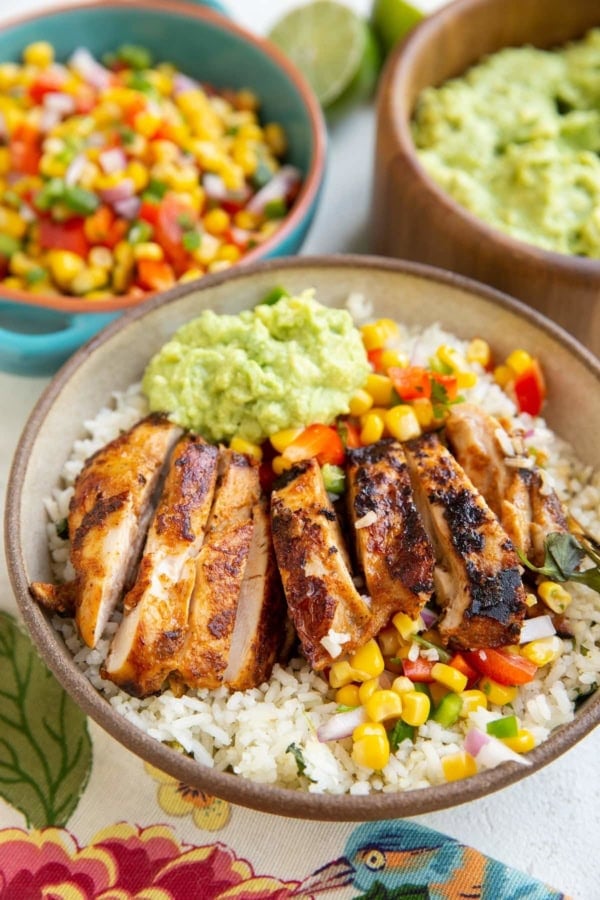
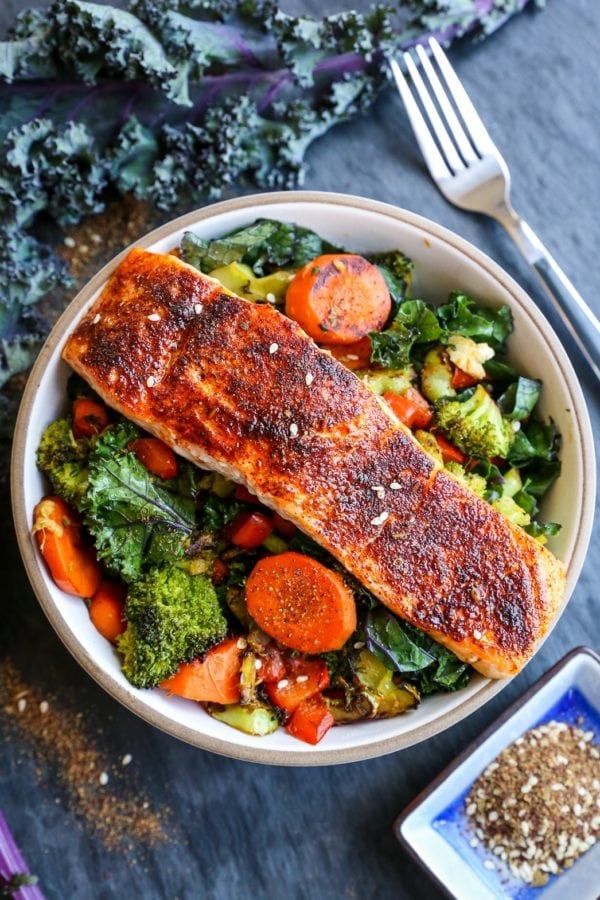
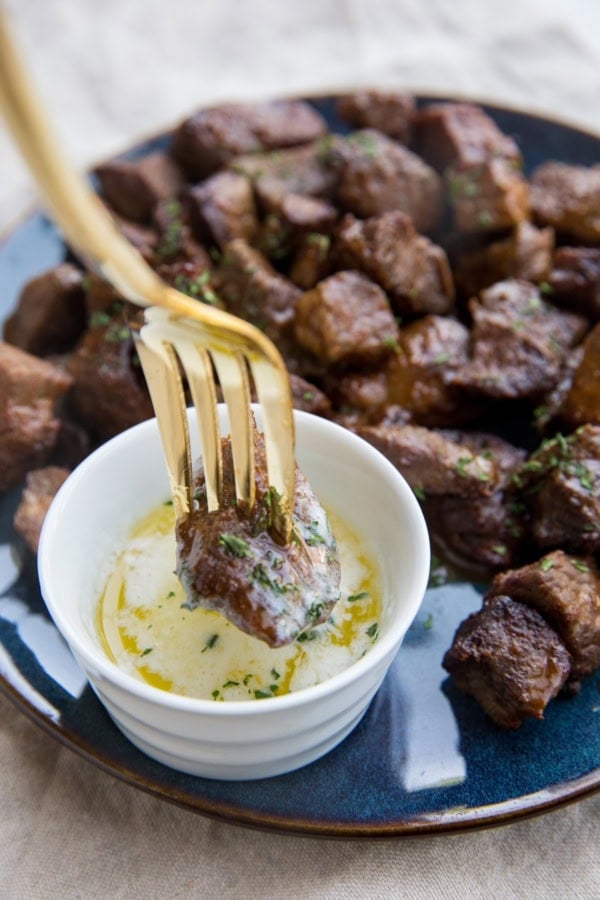









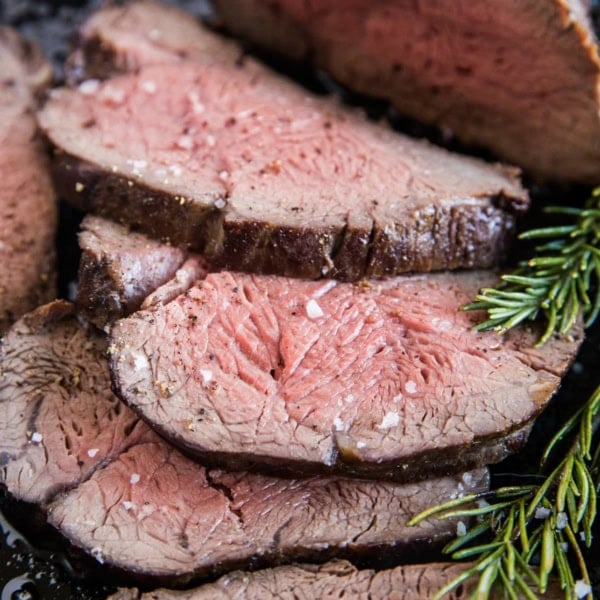
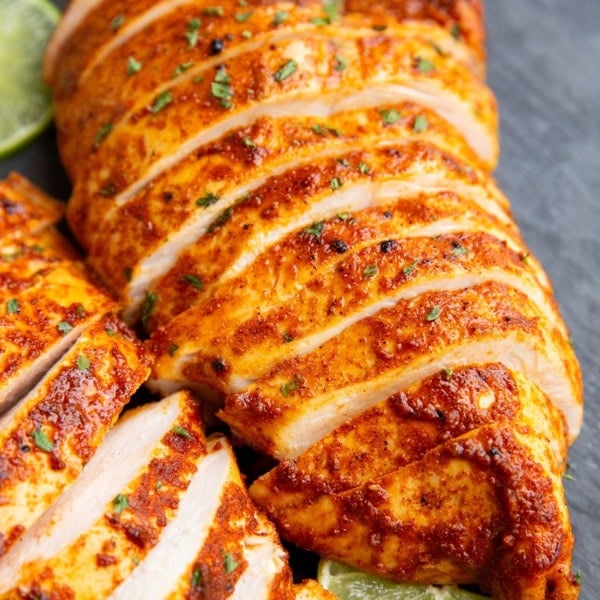

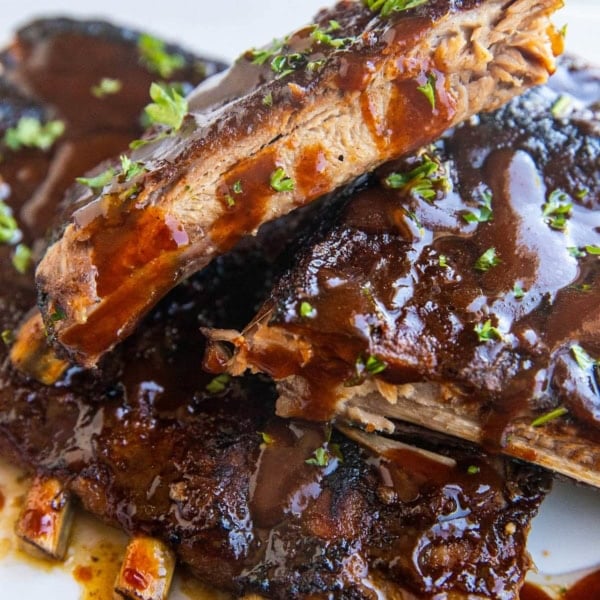


Pro, pre and postbiotics can be very helpful for IBSC, IBSD and IBSM (M=mixed bm. Normal bm followed immediately or almost immediately) by very loose bm or diarrhea,
But..the good gut bacteria needed to help resolve IBSC, IBSD & IBSM, MUST be Spore Forming. Doctors and the scientific community have noted all the pre, & probiotics being pushed for so long are “Antiquated”, dont really do much at all and can actually worsen symptoms. Stomach acid & other digestive processes Kill these good bacteria. They do not reach the entire digestive tract. Spore forming pre, pro & postbiotics not only survive the harsh environment of the entire digestive system, they thrive. Most IMPORTANTLY when researching/buying the Spore Forming biotic, is to make sure they have undergone clinical trials where some test participants have taken a placebo and others take the real deal. Of course look for 3rd party tested for potency and quality also. Also, to me, Extremely important is to purchase a product NOT made in CHINA…you truly never really know what’s in Chinese consumables AND what type of product was just previously used in the equipment used to process the ( or any) consumable product. They just do not care. Some companies will say distributed in so and so city in America, along with the U.S. Flag. That does NOT mean Made in America! Consistency is also extremely important. Start out small, increasing to manufacturers recommended daily serving over a period of a week or two. Take Every day for up to 3 months (depending on severity of symptoms) then take them a few times a week for maintenance. Everyone is different. Try them out paying close attention to what YOUR body is telling you and pay attention to your body’s response.
The more expensive the product, does NOT equate to the best product….far from it. Absolutely no need to pay $100 plus, as I’ve seen. And they did not go through the clinical trials, made in U.S. so on. I found a great product for approx. $30 2 month supply or longer when starting out at low dose, increasing gradually.
Good luck and good health to all.
Are teas like ginger and marshmallow as effective as taking the capsules? Also, does ox bile have any benefit for someone with a gallbladder? Love all your suggestions as I’m currently trying to fix my UC and frequent bladder infections naturally. Thank you!!!
Hi Carol! I would ask your practitioner all of those questions, but here are my thoughts. Ginger tea and marshmallow root tea will still give you some benefits, but because the pills are far more potent, you’d be getting more of an effect out of them. Ox bile helps with the breakdown of fat, so those who still have their gallbladder can benefit from it if they are having trouble digesting their food. Hope that helps! xo
Which colostrum did you take thanks.
Hi there! I take Mt. Capra Goat Colostrum. xoxo
Do you take all these supplements at once or do you just choose a supplement to help you ibs
Hi Beth,
I usually do 2 or 3 of the tools I mentioned. So for instance, drink ginger tea, take magnesium and go for a walk/jog…that sort of thing 🙂
My Doctor’s office is still closed during this pandemic.He takes phones for refills and not much else.
I fear I have IBS and the meds he prescribed are ineffective.. Mainly bloating, tired, stressed, insomnia, odor, no pain except for the arthiritis which he refuses to prescribe anything for..
Allergic
@James, I feel the same,, so glad the Lord lead me to this site, hope it will help!
Oh my goodness I’m so thankful the Lord led me to you. Just reading your article gave me a peace and hope to improve my health. I’m allertto all preservatives additives gums organic or not
Anything that thickens or like dextrose maltodextrin enzymes like in cheese which is off my list. I don’t eat beef chicken or fish or tofu. So what can I eat? No gluten, dairy or sugar. I’m 65 and getting thinner and sicker with this but I have hope and faith that you helped me to give it a go.
No pun intended
Thank you for your eloquent post and honest ♥️
Have just discovered I have IBS, I am 80 years old and have incorporated natural holistic into my daily life so getting this now is a real upset to me. Loved all that you have shared and will certainly be looking forward to all your “news”.
I’m sorry to hear that…IBS can be so frustrating. Mine has gotten a lot better after I began working with my RD, Dena Norton (backtothebooknutrition.com). She works with clients remotely and she has been a dream come true! I felt I wasn’t getting the help I needed from my gastrointerologist, and sure enough, Dena has been my saving grace. Thank you for sharing, Norma! I wish you the best and hope you find some relief soon! xoxoxo
I just love your updates! Thank you so much for sharing your journey!
Loved this article! I suffer from IBS_D and have terrible heartburn. I just ordered marshmallow root and bone broth. I have the plain vital proteins that I add into my coffee or smoothies but I had no idea there were other flavors! Thanks for sharing your personal experiences with these products!
I just found this post and found it incredibly helpful and validating. I’ve also suffer from IBS-C. The bloat/dstension are the worst! I totally made the connection with lack of sleep and no poo. Stress is an huge factor. I’m clockwork all weekend but come Monday…different story. I didn’t know about marshmallow root or peppermint beads and will try those. Thanks for a great post!
You’re very welcome, Jill! Yeeees, sleep is huge! There are so many things we can do to help ease our symptoms, and it often takes a lot of trial and error and patience. Lately, I’ve found taking vitamin C with meat-heavy meals and also first thing in the morning helps a lot! Turns out, vitamin C brings water into your gut, which helps ya poop. Best of luck on your journey, and feel free to reach out if you have any questions. xo
How much Vital Protein collagen do you add to your diet every day?
Hi Janice,
I do two scoops in my bulletproof coffee or matcha in the morning. You can also add it to smoothies 😀 xx
I think my gut is pretty much identical to yours — I suffer from IBS-C and it can be really annoying. Although I do try to avoid sugar (some times of the year I am not so good at it), I am at the point where I am looking at the low FODMAP route. I have struggled most of my adult life with this. Haven’t looked too much into the remedies you listed above but I certainly will now! Thanks so much!
I feel your pain, Brenda! It’s definitely an ongoing process. The fact that there’s so much information now available on the internet has been my saving grace. Patience and gratitude has been key for me. Sending you big hugs and lots of love! We’ve got this! xo
Great article. I didn’t realize how important magnesium is internally. I really enjoy how you combine information with personal experience. I will click on the links you included to learn more!
I’m so glad the post was helpful! YES, magnesium is a big one to pay attention to, and most people never think about it. Thanks a bunch for the feedback! xo
Hi Julia,
Just wondering why you use Marine Collagen rather than Beef Collagen?
Hi Nancy, I use beef collagen from time to time, too! I just got in the habit of using marine collagen, so it’s my knee-jerk reaction to buy it, but beef collagen works fantastically as well! xo
I have taken Vital Proteins beef collagen for years. When I saw Marine collagen on this post I just was curious to know if it has more benefits. It’s almost twice as expensive and the beef isn’t cheap! Thanks for your response!